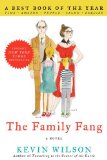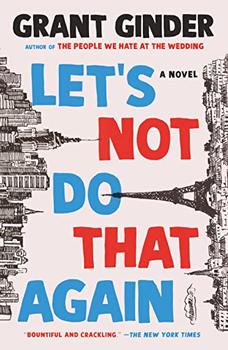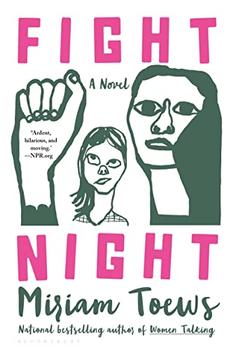Summary | Excerpt | Reviews | Beyond the book | Read-Alikes | Genres & Themes | Author Bio

A Novel
by Kevin WilsonThe premise of this book is so perfect I can't believe it hasn't been done before. Kevin Wilson takes performance art, which is meant to disrupt the everyday, and applies it to that most hidebound of institutions, the American middle-class family. The possibilities are so deliciously ripe.
Initially, it appears that what the Fang family does is disrupt public spaces with their art. They stage performances in malls, parks, and restaurants. They make use of the captive audience inside an airplane on a flight home from a Florida vacation when Caleb Fang, posing as Ronnie Fang, commandeers the intercom and asks his "girlfriend," Grace Truman, to marry him. "Oh, Ronnie," Camille Fang responds, "I told you not to do this." She says no, and for the rest of the flight the passengers are, as a group, tense and uncommunicative. Even the Fangs "could not escape the dread that rattled inside their chests. It was a testament to their proficiency and talent as artists. They had affected themselves with the authenticity of the moment."
As the book progresses, it begins to seem as if the Fangs' real medium of manipulation is not the social contract that governs public spaces but the intimate relationships of the private family. Before each of their "happenings," Caleb and Camille give their children minimal instructions for what will unfold and how they should act. Their children are simultaneously privy to the basic structure of the happening and kept in the dark so that they may be its subjects.
One day, as they enter Atlanta's poshest French restaurant, a place Buster knows they cannot afford, his father simply tells him, "You just have to be ready. You'll know it when it happens. And when it happens, you do whatever comes naturally." Buster eats his way through the unfamiliar meal, growing more and more nervous with each course, wondering when the piece will begin. He tries to reject a liver dish, but his parents make him eat it. "Is this part of the piece?" he asks. The Fangs simply clink their wine glasses together in response. "They seemed so happy, sharing a secret of how the world would end." All too soon, the rich food and the uncertainty have their effect on Buster, and he vomits prodigiously over the elegant table. His sister hustles him outside as he cries out his apologies to the entire restaurant. When his parents join them in their van, they are beaming. "You see now, don't you?" Caleb asks. "You and Buster are Fangs. You are a part of us. We put you in a situation and, without even trying, you made something happen. You created something amazing." Camille adds, "It's inside of you... It's what we do; we distort the world, we make it vibrate, and you kids did it without any help from us."
Is the Fangs' greatest artwork the creation of two children who cannot help but make "art" wherever they go? Have they perversely raised their children such that reality becomes an unending piece of performance art? The book raises these macabre questions with increasing urgency as it progresses. The narrative flips between the present day, when Buster and Annie are adults making their confused way through the world, and their childhood, recounted almost wholly in anecdotes of their parents' art happenings. Annie has grown up to be a celebrity actress and Buster a novelist, and neither of them feel like the creators of their own lives. As one friend tells Buster, "it's like your family trained you to react to the world in a way that was so specific to their art that you don't know how to interact with people in the real world. You act like every conversation is just a buildup to something awful."
Yet Wilson never quite fulfills the terms of the novel as he himself has established them. The book keeps insisting on how weird Buster and Annie are as adults, in flat passages such as this one, when Buster meets a woman who likes his novels: "She was, he began to realize, as weird as he was. Perhaps weirder." But the Fang children aren't weird at all. They are very befuddled by what makes them happy, yes, and they make a host of cringe-worthy decisions, but they are utterly recognizable and sympathetic to the reader, not transgressive or unusual or unsavory. They are the product of bad parenting, accidental creations of their parents' narcissism, but they are not artworks. Wilson has pulled back from his own implicit suggestion that the family is the Fangs' ultimate piece.
Perhaps this has something to do with the way the Fangs define their art. To them, anything is forgivable in the making of a piece, as long as the outcome is "beautiful enough, strange enough, memorable enough." Conspicuously missing from that list are stronger adjectives such as: political, critical, analytical, radical, disruptive. The Fangs do not reference other art in their work, do not build pieces that intervene in the conversations of the day. Ultimately their art has no more "strangeness" than the average episode of "Punk'd." I think the one thing that hampered Wilson from writing a truly unsettling work was his decision to make the Fang children so likable.
And make no mistake, this is a hugely likable book - funny, colorful, and memorable, if not beautiful and strange. What begins as a collection of bizarre anecdotes from the Fang children's early years soon gathers momentum and becomes a mystery. The Fang parents disappear, and Buster and Annie are left uncertain whether the disappearance is accidental or their largest piece yet. I read this book swiftly and compulsively, like sipping thirstily at a fruity cocktail on a hot summer evening.
It would make a great read-aloud for the sophisticated set. I mean no disrespect to the author when I say that my six-year-old perfectly understood the concept of the book, and it absolutely delighted her - surely this is how the world feels to children, who are never in control of their days - and this book has entered our family discourse. Now, whenever we're headed into an untested situation or to meet someone new, my family asks, "What would the Fangs do?" In fact, it rather reads as the PG-13 version of children's books such as The Willoughbys by Lois Lowry and Lemony Snicket's A Series of Unfortunate Events.
I do wish Wilson had pushed his exploration of the manipulative family institution a little further, but this book is fantastic - and suggestive enough that I can take his premise where I want it to go in my own imagination.
About the Author
 Kevin Wilson was born, raised, and still lives in Tennessee. His writing has appeared in Ploughshares, One Story, Tin House, The Greensboro Review, Oxford American, The Carolina Quarterly, and elsewhere. His work has twice been included in the New Stories from the South: The Year's Best anthology (2005, 2006). He has received fellowships from the MacDowell Colony, Yaddo, and the Kimmel Harding Nelson Center for the Arts. A graduate of the MFA program at the University of Florida, he currently teaches fiction at The University of the South and helps run the Sewanee Writers' Conference. He lives in Sewanee, Tennessee, with his wife, poet Leigh Anne Couch, and their son, Griff Fodder-Wing Wilson.
Kevin Wilson was born, raised, and still lives in Tennessee. His writing has appeared in Ploughshares, One Story, Tin House, The Greensboro Review, Oxford American, The Carolina Quarterly, and elsewhere. His work has twice been included in the New Stories from the South: The Year's Best anthology (2005, 2006). He has received fellowships from the MacDowell Colony, Yaddo, and the Kimmel Harding Nelson Center for the Arts. A graduate of the MFA program at the University of Florida, he currently teaches fiction at The University of the South and helps run the Sewanee Writers' Conference. He lives in Sewanee, Tennessee, with his wife, poet Leigh Anne Couch, and their son, Griff Fodder-Wing Wilson.
Photo credit: Leigh Anne Couch
![]() This review was originally published in The BookBrowse Review in August 2011, and has been updated for the
April 2012 edition.
Click here to go to this issue.
This review was originally published in The BookBrowse Review in August 2011, and has been updated for the
April 2012 edition.
Click here to go to this issue.

If you liked The Family Fang, try these:

by Grant Ginder
Published 2023
From Grant Ginder, the author of The People We Hate at the Wedding, comes Let's Not Do That Again a poignant, funny, and slyly beguiling novel which proves that, like democracy, family is a messy and fragile thing - perfect for fans of Veep's biting humor, the family drama of Succession, and the joys of Kevin Wilson's Nothing to See Here.

by Miriam Toews
Published 2023
From the bestselling author of Women Talking and All My Puny Sorrows, a compassionate, darkly humorous, and deeply wise new novel about three generations of women.
Your guide toexceptional books
BookBrowse seeks out and recommends the best in contemporary fiction and nonfiction—books that not only engage and entertain but also deepen our understanding of ourselves and the world around us.